INTERVIEW: Indigo Swing
Interview with Johnny Boyd (Vocals)
By: Alex Steininger
Photos by Chrystaei

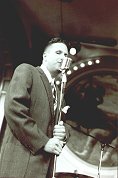 In 1994, Johnny Boyd took his love for swing music and formed Indigo Swing. Very low key at the beginning, as they toured relentlessly, self-released their music, and played packed dance halls throughout the U.S., they watched as swing's popularity started to come back full circle.
In 1994, Johnny Boyd took his love for swing music and formed Indigo Swing. Very low key at the beginning, as they toured relentlessly, self-released their music, and played packed dance halls throughout the U.S., they watched as swing's popularity started to come back full circle.With a new record out on Time Bomb Recordings (distributed by BMG), I sat down with Johnny, the vocalist for Indigo Swing, and we discussed everything from the style involved with swing to their new album and touring habits.
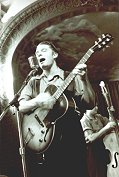 Alex: Besides swing, what are some of your guys' musical influences?
Alex: Besides swing, what are some of your guys' musical influences?
Johnny: Well, everybody in the band has a bunch of different influences. William, the piano player, can play boogie-woogie music one minutes, then stop, and play showpan. He's very talented, and he has an appreciation for both styles. Baron, he plays the tenor, plays this type of music preferably, but also plays international music like Brazilian music. There are many different influences. I know Joshua, the guitar player, likes Charlie Christian. Anything rhythmic and musical we pretty much like. But, it just so happens, this is the stuff we like the most.
Alex: What are your band goals for the rest of 1998?
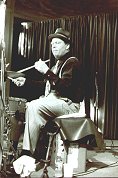 Johnny: Well, we just got a record deal with Time Bomb Recordings. That record hits the stores on July 14th. So for the remainder of 1998 I think we'd like to tour other parts of the world, have a good selling record, and I would like to be working on our second one at that point. Writing new songs.
Johnny: Well, we just got a record deal with Time Bomb Recordings. That record hits the stores on July 14th. So for the remainder of 1998 I think we'd like to tour other parts of the world, have a good selling record, and I would like to be working on our second one at that point. Writing new songs.
Alex: How did your deal with Time Bomb come about?
Johnny: We took on a manager in Hollywood. She is a promoter, and she knew Jim, who was the A & R guy for A&M Records for 15 years. He decided to leave A&M and start his own little company called Time Bomb. She brought him to a show one night, and he got hooked. Then, everything happened from there. We feel very lucky that we're on Time Bomb. They're not a major conglomerate, bureaucratic label that has ideas of how they want things done and make them fit in. Time Bomb has actually looked to see what we do, and developed a plan to make us successful doing what we do, rather than visualizing what we should be.
Alex: How would you rate your new album, ALL ABOARD!, compared to your other albums? How is it different and how is it the same?
Johnny: It's much more representative of our live show. Our first one was a independent recording we did on our own. We paid for it with our own money, and that was about 2 and a half years ago. We've done really good with it, but it doesn't represent what we do live. All Aboard! has much more of that ballroom sound. It sounds a lot better to me, and I think it's one of the best recordings we've made.
Alex: Is it a leap from going from independently releasing yourself to signing with Time Bomb?
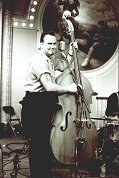 Johnny: Well, the scales increase quite a bit. You're not making a promo piece to give away to people to let them know about our music, now you're making something that can be bought at record stores all over the country. You're making something that will be played on radio stations, hopefully all over the country.
Johnny: Well, the scales increase quite a bit. You're not making a promo piece to give away to people to let them know about our music, now you're making something that can be bought at record stores all over the country. You're making something that will be played on radio stations, hopefully all over the country.
Alex: What are your expectations for the new album?
Johnny: Well, everybody in marketing tells us the market is right for this type of music. And all I know is what I've seen at our shows, and I think that's right. We're a little bit different than what I think has already been heard out there. I think that's a good thing. People want something different, and I think they're ready for other kinds of music. They've spent 30 years dancing apart, and now I think they want to dance together. A lot of people like old time stuff, yet there is a lot of people that haven't heard this type of music before. I think they'll like it, and I'm hoping it will catch on. I think the album represents what we do quite well, so I'm hoping people like it. But at this point I'd get into trouble if I start predicting what's going to happen.
Alex: Are you expecting this disc to expand your fan base?
Johnny: I hope so. We'd like to have our music exposed to as many people as possible. It is already exposed to a lot of people who dig swing music, they're learning how to dance to it. But it hasn't caught on with the mainstream yet. Well, it has for a few bands that have been successful to date, but we're hoping it will become a lot more mainstream with us. That's our goal. And we'd like to see people who've never heard swing music start buying our album, and not just our album, but older ones as well. All the stuff that's out there that they didn't know existed.
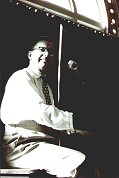 Alex: What do you think caused the resurgence in swing?
Alex: What do you think caused the resurgence in swing?
Johnny: There is a band out of Los Angeles, who used to come up to San Francisco all the time, called Royal Crown Revue. I think they were doing this nine, ten years ago. They were largely responsible. They were ahead of their time. Everywhere we go, people know who they are. There has been bands after them, but they're just trying to be like Royal Crown Revue. I think RCR is one of the top three bands I've ever seen. In San Francisco, people had started to veer away from the things that they had seen for thirty years. There are only so many tattoos you can have put on your body, and there are only so many places you can have pierced. They started going out to shows and taking the extremes in the opposite direction. They started wearing the grandparents clothes, then they learned how to dance. I think it's not just about the music, I wish it was, but I think it's a deeper social issue. People want to dance together. Dancing is a great ice-breaker. You don't have to know anything about the person to dance with them.
Alex: Do you think dress and music go hand-in-hand?
Johnny: I think so. I think it helps, because you can dig both more when you have interest in both. There are people who come to our shows in t-shirts and jeans who can dance quite well, and as long as they're digging the music, that's the important thing. But, I think it's the desire to be more sociable. The 70's and 80's were the "me" times. You'd ask someone to dance, and then try and out dance them. Now, people want to look good dancing together. They want to have more contact with each other, and I think the music helps that.
Alex: Do you see any downfalls to the resurgence?
Johnny: Well, it's easy to say that if someone gets a hold of something they kill it. If they start running Burger King commercials with the music in it, and it starts appearing all over TV and movies, but I'd be a fool to say that isn't going to help my band. It will open people's eyes up to come see our shows. Then, maybe that will push them to buy our CD or someone else's. It's all education, so I don't see it as a downfall. I could see it someday wearing itself out, but as long as people want to have fun and dance with each other, it will be around. Or something like it will be around.
Alex: With the new album, are you planning to release any singles or videos?
Johnny: I think so. We're planning on a video. Possibly "How Lucky," and we're waiting to see what the radio wants to play. At that point, we'll see if it warrants a video. I think we might even record "How Lucky" in Spanish.
Alex: What do you guys do on the road for fun?
Johnny: We all have our own little things that we like to get done. Wade, our piano player, is a gourmet. He has a radar sense, and always figures out where to go to eat. So, we eat pretty good on the road. He always finds the best places. Joshua listens to a lot of music, and Lance (bass) brings a boom box with him. He hardly ever watches TV, and always has his boom box with him. He has a righteous CD collection, and is always listening to something different. We all have things that we like to do, and we all have things that we do over and over again on the road, but it's pretty fun, for the most part.
Alex: Do you have a favorite city or venue to play?
Johnny: I think Portland is up there. We had a great show in Seattle last night. I love the West Coast, I think the West Coast is awesome. We've played all over the place now, and I like New York, but I'd have to say Portland is one of my top three. The other ones would have to be San Francisco and Seattle.
Alex: So, did you play with other bands last night?
Johnny: No, we did the show ourselves. It was at the Century Ballroom, a really nice place, and we did the whole show. It was just like tonight's show.
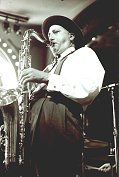 Alex: When it's just you guys, how long do you play?
Alex: When it's just you guys, how long do you play?
Johnny: That all depends. Tonight, I think we're doing three sets. Two long ones and one short one. But, typically I think we do two sets.
Alex: If you could tour with anyone, who would you like to tour with?
Johnny: There are a lot of bands that I dig, that are modern bands, and playing with them would be great to get us seen. Harry Connick, Jr. is a very talented dude, and I think it would be great to tour with him. We're going to be touring with Brian Setzer for some East Coast dates in the middle of July, right around the time our CD gets released. I am looking forward to that, because I was listening to him in high school. I like Bonnie Raitt, Blues Traveler, Chris Isaac, I'm a fan of all of them. I would play with anyone that could compliment what we do, and we could compliment what they do.
Alex: Is there any road experience that stands out in your mind?
Johnny: Not really, actually. I don't think we've ever been double booked, and I think we've almost always gotten paid. There was this time in North Carolina, well...yeah, this is interesting. The first time we went through Carolina we played in Charlotte and Raleigh Durham . In Raleigh Durham we had five people show up, and in Charlotte we had three. This was like a year ago, and I don't even think they knew what we did. So, when we were booking our last East Coast tour, we are all like, "Let's just skip North Carolina." We ended up staying four or five days this trip, and we sold out three shows. The word is definitely spreading, but those were a tough two days!
Alex: What do you enjoy and hate about the music industry?
Johnny: The most frustrating thing is that it's not about the music with a lot of people. It's all about what happens to be hot at the moment. That's why I was saying I feel very fortunate to have the manager and record label that we do. They aren't trying to make us something we're not. They take what we are, which is an all-acoustic swing band, and sell us on that. They're doing pretty well, I think. When you've found people that will let you do what you do best, it's a great combination. That's what I like about it. It's restored my faith that there are actually people in the business that get that. But, the part I don't like, is the "let's have lunch" stuff. You never know if they're telling you the truth or not, but that's business. You need those people, because those are the people that are actually out in the trenches selling your stuff. A lot of people wouldn't be at our shows if it weren't for them.
Alex: Were you considering other labels before you signed with Time Bomb Recordings?
Johnny: Yeah. There were some good sized labels interested, from what I was told. We didn't even hear much about it until the Time Bomb deal came in and our manager discussed it with us. So we decided on it. The other labels weren't here and they weren't there, but they knew they wanted to sign us. They were just what I said, they had no idea what we were, they just wanted to sign us. They would of had no clue what to do if they would have signed us, but Time Bomb had a great marketing plan already mapped out. They did research, figured everything out...they had their shit together.
Alex: As a whole then, is there anything you look back on in your band's history and wish you could go back and change?
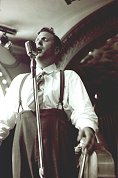 Johnny: I think everything is a learning experience. We're still learning about being a traveling unit. We've only been doing that for about a year and a half. I would have known how to execute the things we've written better, but other than that, we've been growing and working together better now. The beginning was time we spent learning and trying to find everything, and not only are you trying to get your sea legs, but you're trying to get better as a band. And when you're traveling every day and still trying to learn all that, it's way too much. So, if I had to look back on it...I'm very lucky as a singer to have the guys I have. There isn't a day that goes by when I don't pinch myself for being so fortunate. It's so amazing that they are as good as they are and that they enjoy playing and writing as much as I do. So, all we really want to do is look forward.
Johnny: I think everything is a learning experience. We're still learning about being a traveling unit. We've only been doing that for about a year and a half. I would have known how to execute the things we've written better, but other than that, we've been growing and working together better now. The beginning was time we spent learning and trying to find everything, and not only are you trying to get your sea legs, but you're trying to get better as a band. And when you're traveling every day and still trying to learn all that, it's way too much. So, if I had to look back on it...I'm very lucky as a singer to have the guys I have. There isn't a day that goes by when I don't pinch myself for being so fortunate. It's so amazing that they are as good as they are and that they enjoy playing and writing as much as I do. So, all we really want to do is look forward.
Alex: So, what are the highest and lowest points your band has experience so far?
Johnny: I think one of the highest points was hearing our song on the radio for the first time. Especially a big radio station, it's just amazing. We played our first show in Portland for the Cherry Poppin' Daddies, at the Crystal Ballroom, and that was a sold out show.
Alex: I was there.
Johnny: You were there? Great. That was just amazing. It was such a rush to play for all those people. Once we got off stage, we walked downstairs and the Cherry Poppin' Daddies were there, ready to go on, and they were asking us why we didn't do an encore. We were like, "We're your opening band. We don't want to steal your thunder like that." But they were so cool and kept telling us to do an encore, and by this time, they were still stomping upstairs. We thought about it, but decided not too.
Alex: What made you want to be in a band?
Johnny: I loved music, and sang when I was a kid. I never had exposure to this type of music, because I grew up in Arizona, but when I moved to San Francisco I was exposed to all these new types of music. I was buying everything I could get my hands on, because S.F. is a very diverse town and I had all this stuff at m disposal. After awhile of singing everyday to yourself in the car, singing in the shower, and I did some singing in college and high school, so I decided I wanted to start a band. I started while I had a day job, and pretty soon I quit my day job and started doing it full time. It is just rewarding as hell for me. More rewarding than anything else I've ever done. It's music, it's musical. To get paid to do what you love is a great thing.
Alex: What goes into good music making for you?
Johnny: The stuff that we make and write, I write most of the words. Although, William wrote two of the songs that are on our new disc. We just write about things that are things that are...I mean, if you were to close your eyes and listen to our new album from beginning to end you'd be hard pressed to tell which are the old ones and which are the new ones. The things we write about and the issues we deal with are ones that haven't changed a lot over time. People still fall in and out of love, they still have people leave them, they still want to have a better life and be richer, there are just all kinds of dreams that are loved and lost, and they'll always be around as long as there are human beings around. Music to me is a lot of that.
Alex: Do you have a favorite track on the new album?
Johnny: I think my favorite track on the new album is a blues number called "So Long." There is also a Willie Dixon tune on there called "Violent Love," and I like that one too.
Alex: The contrast in that song is weird. To hear this soft, dance song with the word "violent" plastered all over it. It takes on a whole different meaning in our time and lives.
Johnny: You and I grew up where violent meant something totally different than when that song was written. Violent, in those times, was kinda the same. But it was written more so to express a extreme state of mind. If you were 'violently hungry' you were extremely hungry. If you were violently in love, it was meant to mean you were deeply, extremely in love. So when we sing "Violent Love" we are singing about being extremely in love. That's why we like that song, the meaning of the word when it was written and singing it today gets people's attention.
Alex: What do you want the listener to get out of your music?
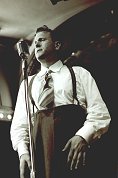 Johnny: I would like them to be able to learn how to dance, if they want to learn. I also think they should go out and buy more types of this. I want them to appreciate music that doesn't have a synthesizer attached to it. Maybe buy some more roots based jazz. If they can realize that there is a bunch of material they have never heard, that is what I would love. I would also like them to come back and see us. Come check out our show and have a good time, and then come back next time we're in town.
Johnny: I would like them to be able to learn how to dance, if they want to learn. I also think they should go out and buy more types of this. I want them to appreciate music that doesn't have a synthesizer attached to it. Maybe buy some more roots based jazz. If they can realize that there is a bunch of material they have never heard, that is what I would love. I would also like them to come back and see us. Come check out our show and have a good time, and then come back next time we're in town.
Alex: Is there anything I left out that you would like to cover?
Johnny: We travel with an acoustic piano, which is unusual, and we are a dance band. Our primary interest is to get people dancing.

